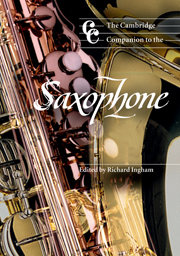Book contents
- Frontmatter
- 1 Invention and development
- 2 In the twentieth century
- 3 Influential soloists
- 4 The repertoire heritage
- 5 The saxophone quartet
- 6 The mechanics of playing the saxophone: Saxophone technique
- 7 The professional player: The saxophone in the orchestra
- 8 Jazz and the saxophone
- 9 Rock and the saxophone
- 10 The saxophone today: The contemporary saxophone
- 11 Teaching the saxophone
- Notes
- Appendices
- Bibliography
- Index
3 - Influential soloists
Published online by Cambridge University Press: 28 September 2011
- Frontmatter
- 1 Invention and development
- 2 In the twentieth century
- 3 Influential soloists
- 4 The repertoire heritage
- 5 The saxophone quartet
- 6 The mechanics of playing the saxophone: Saxophone technique
- 7 The professional player: The saxophone in the orchestra
- 8 Jazz and the saxophone
- 9 Rock and the saxophone
- 10 The saxophone today: The contemporary saxophone
- 11 Teaching the saxophone
- Notes
- Appendices
- Bibliography
- Index
Summary
This chapter surveys artists who have exerted, and continue to exert, significant influence upon the direction and acceptance of the ‘classical’ saxophone and its repertoire.
Before the emergence in the late 1920s of Marcel Mule and Sigurd Rascher came the inspiration and tireless efforts of Adolphe Sax himself and a number of contemporaries.
Early soloists
Belgian-born Henri Wuille (1822–71) was a contemporary of Sax and one of the most ardent proponents of the new instrument. He toured widely, performing on both clarinet and saxophone to great acclaim, and his tours with impresario Louis Antoine Jullien led to his being credited as the earliest solo performer on the saxophone to play both in England and the United States.
M. Souallé (dates unknown), also Belgian, attracted the praise of Hector Berlioz after a concert in Paris in 1851, following his return from several saxophone performances in London in 1850. Souallé's artistry was proclaimed, as were the saxophone's then already obvious (at least to Berlioz) ‘incomparable and expressive qualities; the trueness and beauty of sound which can be produced when one really masters the technique are such that it can, in slow pieces, challenge the finest singers’.
Louis-Adolphe Mayeur (1837–94) earned a first prize for clarinet at the Paris Conservatoire and became an accomplished saxophonist after studies with both Klosé and Sax. He performed regularly with the Paris Opera and taught widely, contributing a tutor, the Grande Méthode, for saxophone published in 1867.
- Type
- Chapter
- Information
- The Cambridge Companion to the Saxophone , pp. 37 - 50Publisher: Cambridge University PressPrint publication year: 1999



